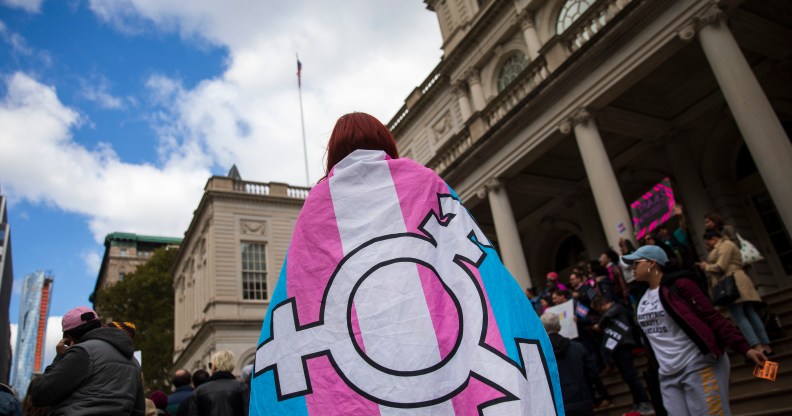Trans people are twice as likely to be victims of crime in England and Wales than cis people, new figures reveal

A person draped in a transgender flag. (Drew Angerer/Getty)
Trans people in England and Wales are twice as likely to experience crime as cisgender people, according to the first official data on trans crime victims.
Figures from the Office for National Statistics (ONS) showed that more than a quarter (28 percent) of trans people had been victims of crime in England and Wales in the last year. In comparison, 14 percent of cisgender people had experienced crime in the year ending in March 2020.
This is the first time that the ONS has published crime data that records the gender identity of victims.
The office said it had removed fraud from the data as it was “often less targeted”, and added: “The data excluding fraud therefore present a more accurate picture of the differing likelihood of experiencing crime by demographic characteristics.”
Having a non-straight sexual orientation also made people more likely to experience crime, according to the ONS.
While 14 percent of heterosexual people were victims of crime in the past year, this figure rose to 21 percent for those who identify as lesbian, gay or bisexual.
Data obtained by the BBC last year showed that the number of hate crimes against transgender people recorded by police in England, Scotland, and Wales in 2018/19 had surged by 81 percent within a year.
Of the 36 police forces that provided data, 34 recorded an increase in anti-trans hate crime reports, while West Yorkshire Police and South Yorkshire Police saw reports of anti-trans hate crimes treble over three years.
Representatives of LGBT+ charity Stonewall suggested the rise could be linked to a surge in anti-trans rhetoric in the media and public discourse.
Stonewall campaigns director Laura Russell told the BBC: “These statistics are the real life consequences of a society where transphobia is everywhere – from the front pages of newspapers, to social media, and on our streets.
“We need people to realise how severe the situation is for trans people, and to be active in standing up as a visible ally to trans people, in whatever way they can.”

